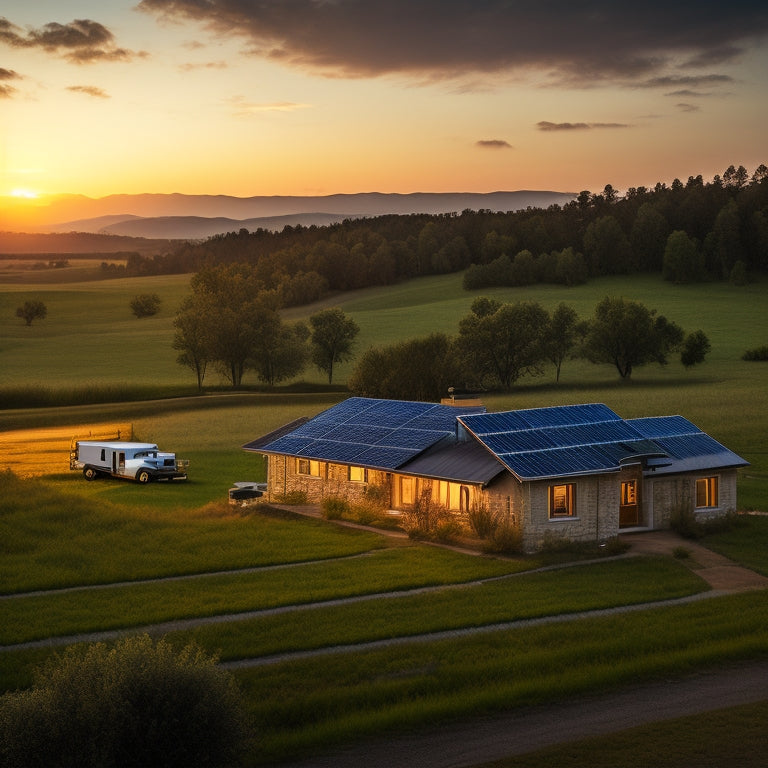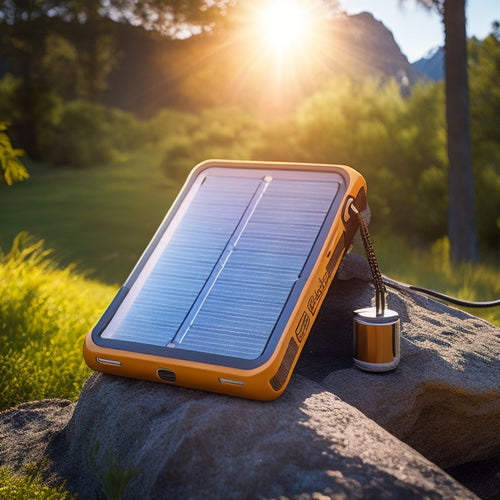
3 Best Solar Battery Solutions for Rural Electrification
Share
You need reliable solar battery solutions that can withstand harsh environmental conditions and provide a stable power supply for rural electrification. Lithium-ion batteries and lead-acid batteries with deep cycle capabilities are top choices for rural energy needs, offering efficient operation in extreme temperatures and challenging infrastructure conditions. When comparing solar battery solutions, consider performance, cost, and maintenance requirements to secure stable and consistent power. You'll want to evaluate total cost of ownership, product reviews, and warranty terms to find the best fit for your rural electrification needs - and that's just the starting point for finding the right solution.
Key Takeaways
• Lithium-ion and lead-acid batteries with deep cycle capabilities are top choices for rural energy needs due to their efficiency in harsh environments.
• Energy access is vital for rural development, impacting essential services like healthcare and education, making stable power supply crucial.
• Evaluate performance, cost, and maintenance requirements of lithium-ion and lead-acid batteries to determine the best solar battery solution.
• Consider total cost of ownership, including upfront cost, maintenance, and replacement costs, when selecting a solar battery solution.
• Lead-acid, lithium-ion, and sodium-ion batteries are viable options, each with their advantages and disadvantages, for rural electrification.
Top Picks for Rural Energy Needs
When selecting solar battery solutions for rural electrification, you need systems that can withstand harsh environmental conditions and provide reliable, long-lasting power. This is why lithium-ion batteries and lead-acid batteries with deep cycle capabilities top the list for rural energy needs. These batteries are designed to operate efficiently in extreme temperatures, humidity, and other challenging rural infrastructure conditions.
For rural communities, energy access is a vital aspect of development. Without reliable energy, essential services like healthcare, education, and communication are severely impacted. Lithium-ion and lead-acid batteries with deep cycle capabilities provide a stable and consistent power supply, ensuring that rural communities have access to energy when they need it most.
These batteries are also designed for long-term performance, reducing the need for frequent replacements and minimizing maintenance costs. By choosing the right solar battery solution, you can make sure that rural communities have access to reliable, sustainable energy. This paves the way for improved rural infrastructure and economic development.
Solar Battery Solutions Compared
You'll want to evaluate the performance, cost, and maintenance requirements of lithium-ion and lead-acid batteries with deep cycle capabilities to determine which solar battery solution best suits your rural electrification project. This comparison is important to guarantee you make an informed decision that meets your energy needs and budget.
Here are key factors to take into account in your evaluation:
-
Cost analysis: Calculate the total cost of ownership, including the upfront cost, maintenance expenses, and replacement costs over the battery's lifespan.
-
Product reviews: Research and analyze reviews from other users to get a sense of each battery's real-world performance, reliability, and durability.
-
Cycle life and depth of discharge: Assess the number of charge cycles each battery can handle and the maximum depth of discharge to ensure it can meet your energy demands.
- Warranty and support: Evaluate the warranty terms, customer support, and after-sales service offered by each manufacturer.
Off-Grid Energy Storage Options
Selecting the right off-grid energy storage option is essential to guaranteeing a reliable and efficient solar-powered system, as it directly impacts the overall performance and lifespan of your rural electrification project. When choosing an off-grid energy storage solution, you should consider factors such as capacity, depth of discharge, and type of battery technology.
| Energy Storage Option | Advantages | Disadvantages |
|---|---|---|
| Lead-Acid Batteries | Cost-effective, widely available | Limited lifespan, heavy, maintenance-intensive |
| Lithium-Ion Batteries | High energy density, long lifespan | Expensive, sensitive to temperature |
| Sodium-Ion Batteries | Cost-effective, sustainable | Lower energy density, still developing |
Off-grid energy storage solutions play a vital role in achieving Energy Autonomy in rural areas, where grid connectivity is limited or non-existent. By selecting the right energy storage option, you can ensure Remote Resilience and a reliable supply of electricity, even during periods of low solar irradiance or grid outages.
Frequently Asked Questions
Can I Use Solar Batteries With Existing Diesel Generators?
You can combine solar batteries with your existing diesel generators through Diesel Hybridization, where Generator Synchronization guarantees seamless switches, resulting in significant Fuel Savings, while System Integration provides reliable Backup Power when needed.
How Do I Maintain and Troubleshoot Solar Battery Systems?
You'll maintain and troubleshoot your solar battery system by monitoring battery health, tracking performance metrics, and optimizing system settings to guarantee efficient energy storage, all while keeping a close eye on temperature, state-of-charge, and voltage fluctuations.
Are Solar Batteries Suitable for Small-Scale Rural Electrification Projects?
You're considering solar batteries for small-scale rural electrification projects, and rightly so, as they enhance rural accessibility by providing energy reliability, especially in areas with limited grid connectivity, making them a viable option.
Can I Scale up Solar Battery Systems for Larger Rural Communities?
You can scale up solar battery systems for larger rural communities by evaluating rural infrastructure, matching energy storage to community-specific energy demands, involving community engagement, and prioritizing power reliability to guarantee a stable supply.
Do Solar Batteries Require Special Installation and Training?
You'll need specialized installation and training for solar batteries, as they require certification programs and adherence to strict safety protocols to guarantee safe and efficient operation, avoiding electrical shock and fire hazards.
Related Posts
-

Net Metering in Renewable Energy's Future
Net metering's future is vital for driving renewable energy growth and financial savings. You can reduce your electri...
-

Building an Emergency Backup Solar Power System in 5 Essential Steps
Building an emergency backup solar power system involves five key steps. First, assess your daily energy needs to ide...
-

Fastest Solar Chargers for Emergency Power
When choosing the fastest solar chargers for emergency power, you need to focus on features like rapid charging capab...


